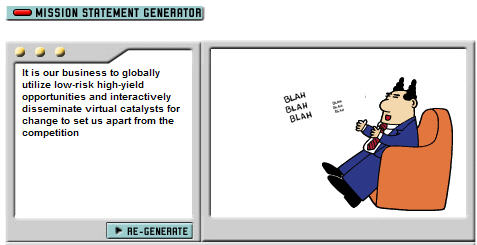I’ve been doing a survey of children’s ministries in preparation for some new courses. I’ve been intrigued by the use of “mission statements†by children’s ministry programs in congregations. I’ve got mixed feelings about mission statements in general. As someone who has been involved in creating them in the corporate business setting and in congregational settings I’m skeptical that they are ever much more than an end product of the few who happened to participate in their creation. Soon the “mission statement†intended to be a guiding or defining force reflective of the entire organization becomes not much more than a pretty framed plaque or poster on the church foyer wall.

(The Dilbert Mission Statement Generator)
Guy Kawasaki recommends that any organization seeking to create a mission statement will do as well as to use the Dilbert Mission Statement Generator as pay the big bucks for a consultant who will help your organization develop one. In the case of congregations, I concur: developing “mission statements†may not only be ineffective, but ultimately contrary to the nature of congregations as communities of faith. Communities are bound by covenants and by trust, not by contracts, dictates, or statements produced by a few. And, unlike corporations, communities are evolutionary and developmental. Meaning that unlike corporations, where what you get at the beginning is what you always get, communities must change (develop, adapt) or die. Therefore no mission statement will ever have much of a shelf life.
But, congregations have a penchant for modeling corporate structures, processes, and products. And so no self-respecting congregation today will be without its mission statement. But ask a group of randomly picked church members in those very congregations and I’m willing to wager that most will not be able to tell you what the mission is or the statement says (and not a few will respond, “What mission statement? We have a mission statement?â€).
Below are links to the Children’s Ministry mission statements of some congregations. As you read through these ask yourself:
- Can my congregation endorse that mission statement?
- Can I embrace the values in the mission statement?
- Is there a theology that informs the mission statement?
- Does the mission statement seem unique to the congregation as a particular community of faith?
- Is the mission statement so generic as to be universal to any congregation and context?
- Does the mission statement hint at a particular educational philosophy?
Promiseland Children’s Ministry (Willow Creek Community Church)
Oceanside Christian Fellowship
Westminster Presbyterian Church
Mission statements can be part of the process of intentionality in an organization. But the key word is “process” not the overfocus on the “product” or on producing a well-parsed statement. Congregations are communities of faith—ultimately, they need different than what a corporate mission statement is able to provide.


1 Response to Children’s ministry mission statements